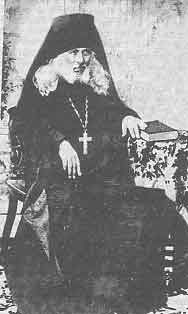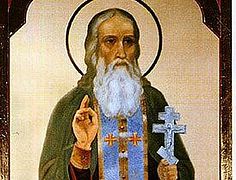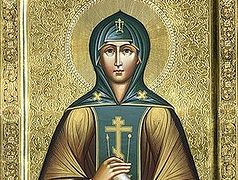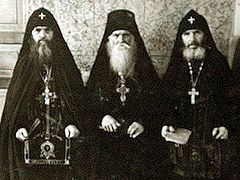
From early youth, Fyodor was a serious person who strictly observed the fasts, avoided rowdy company, and sought out solitude. The boy loved music very much. He learned to play the piano and to sing liturgical music, and he sang in the church choir. It should be noted that Fr. Pavel Smirnov, a deacon at the neighboring church who was later to become Fyodor’s father-in-law, taught him to read and write. Having inherited his father’s Christian love for God and man, the youth decided at an early age to dedicate himself to serving the Lord.
Upon completing his studies at the St. Andrew’s religious school, Fyodor enrolled at the Moscow Seminary. In 1866 he graduated from the Seminary. Before he could be ordained to the diaconate, the youth had to find himself a wife. He chose Anna, Fr. Pavel’s daughter. They were married on February 12, 1867. On February 19, at the Chudov Monastery, Fyodor was ordained a deacon. Metropolitan Philaret of Moscow assigned him to serve in the Church of St. Nicholas in Tolmachakh. His first years at Tolmachakh were quite pleasant. Both the rector and the flock found the young deacon to their liking. On July 23, 1868, Fyodor and Anna had a son, whom they named Michael. In 1872 Anna succumbed to an intense fever. At first, the young deacon was devastated by the unremitting pain of loss. Archpriest Vladimir, the parish rector, decided to have Deacon Fyodor find relief in work activity: he put him to work editing Readings Good for the Soul.
The editorial work awakened in Deacon Fyodor an interest in literary activities. He had to read a lot of religious literature and to write articles for the magazine. Many of those articles were later published as separate brochures. At the same time, he taught Law of God classes, pro bono, at an orphanage. He tried to avoid declining any opportunity to help the needy. Not only did he distribute money daily to those in need, but he would help the poor in every way he could: He would invite them to his home and would feed and clothe them. On one occasion, upon seeing a poor man shivering with cold on the street, the deacon took off his outer riassa and gave it to him.
In May, 1895, Fyodor Alekseevitch left the St. Nicholas-Tolmachevsky parish. He received an invitation from Metropolitan Sergius of Moscow to become the presbyter of the Uspensky [Dormition] Cathedral in the Moscow Kremlin. The Metropolitan of Moscow had decided to reinstitute ancient banner chant at the Uspensky Cathedral. In such chant, instead of the usual chanters, presbyters and deacons stand on the kliros and sing in unison. For that reason, deacons with strong voices were sought out from throughout the parishes of Moscow.
On June 4, 1895, Deacon Fyodor was ordained to the priesthood and assigned to the staff of Russia’s principal cathedral. Two years after his ordination he was unanimously elected to be dukhovnik [confessor] for the cathedral clergy.
Of all the holy things belonging to the cathedral, Fr. Fyodor most revered and treasured the Vladimir Icon of the Mother of God, in which the image of the Queen of Heaven is delineated with unusual spiritual purity. Many years later, the elder was to share some of his recollections of that period:
Sometimes you would come to the Cathedral at 3:00 AM to serve Matins, and a pious trepidation would seize you ... In the church’s mystical semi-darkness all of Russia’s history would rise up before you. The protection of the Mother of God would work its miracles during the years of misfortunes, and I would then want to pray for Rus’ and for all her children, to dedicate myself entirely to God, nevermore returning to the world of vanity.
Through God’s providence, in 1898 Fr. Fyodor got his wish, and was tonsured a monk at the St. Zosima Hermitage. On November 30, 1898 Fr. Herman, abbot of the monastery, tonsured him a hieromonk and gave him the name Alexei.
His first years of life at the monastery were fraught with great difficulties.
The number of people coming for confession to Fr. Alexei grew quickly. While at first only little old ladies would go to him for confession, soon many young monks became his spiritual children, and a few years later Abbot Herman became his spiritual child as well. The Lord imparted many gifts to Elder Alexei: prominent among them was the gift of the wisdom of eldership, humility, love, and clairvoyance. In 1906, after Elder Varnava of Gethsemane Skete reposed, many of his spiritual children appealed to Elder Alexei for help and support. Teachers and students from the Moscow Academy, government officials, priests, military personnel, physicians, bureaucrats, and teachers would all come to him. Laborers and peasants would turn to him for help in the difficulties they encountered in life. The Elder had to confess hundreds of people each day, and his loving heart made room for the sufferings of all those who suffered; he would pray for each person individually. Elena Mazhorovaya, one of his spiritual children recollected:
I would often reflect on how an elder of such advanced age, someone who was infirm, someone who would give himself up for days at a time to serving the people, could always be temperate and patient with everyone, could always show an unflagging spirit ... It seems to me that simply on account of weakness, anyone else would be unable to treat us, those who had come last, the same as he treated those who were first. But to batiushka it made no difference. One could go to him at any time without fear, with the conviction that his love and spiritual powers could not dissipate for anyone ... The elder showed great condescension towards anyone truly seeking after salvation. There was no sin that Fr. Alexei would not immediately forgive, except the sin of spiritual pride. “I humbled myself, and the Lord saved me,” he would repeat. He would often say, “It is no surprise that you are suffering; that is needed so that you can understand others’ suffering. Be patient and endure; Christ, who was without sin, endured insults from [His] creation, and who are you not to have to suffer? Are you aware that the soul is cleansed through suffering? Are you aware that if Christ visits sorrows upon you, He is remembering you? To choose your way of life yourself is the most difficult thing of all. Entering into life, one must pray to the Lord that He direct your path. He, the Most-high, gives each person a cross consonant with the disposition of the human heart.
It would often happen that, with his gift of clairvoyance, during confessions the elder would remind the penitent of one of his sins. The elder was quite clairvoyant. Sometimes he would tell in great detail what was happening, and in what circumstances.
From Fr. Simon’s recollections about Fr. Alexei:
Whenever we, who lived in the St. Zosima Hermitage, would lose our spiritual peace, we would come to Elder Fr. Alexei and would open up our souls to him. The elder would tell us that spiritual peace is most often disturbed by our condemning our neighbors and by being dissatisfied with our life. Whenever we would start to speak critically about someone, the elder would stop us: “We have nothing to do with others. Talk only about yourself. The canons of the holy fathers direct that you must stop someone confessing when he talks about others.” And we, observing that rule, were vigilant over ourselves, so as not to say anything about others. The elder also instructed us, “When the soul accuses itself in everything, God loves it, and when God loves it, what more do we need?” After confession and the reading of the prayer of absolution over us, we again would thirst after the spiritual life, and peace would once again reside in our souls.
Elder Alexei’s yearning for silence, his need to be alone in order to focus on internal prayer, and his physical weakness forced him to ask to go into seclusion. His request was satisfied in part in February 1916, when he went into “semi-seclusion.” He would admit people to confession in the church only on Saturdays and Sundays, but for the laity he was already inaccessible. In June 1916 the seventy-year-old elder was permitted to go into total seclusion.
In the summer of 1917, the elder was forced to leave his seclusion in order to take part in the All-Russian Local Council, at which it was decided to restore the Patriarchate in Russia. On November 5, 1917, in the Church of Christ the Savior, he was entrusted with the duty of drawing by lot the name of the new patriarch.
Before the divine services had begun, in the altar Metropolitan Vladimir of Kiev had written down on [pieces of] parchment the names of the candidates for patriarch, and put them in a special casket. During the Liturgy, the miraculous Vladimir Icon of the Mother of God was brought from the Uspensky Cathedral. Upon the conclusion of the Divine Liturgy, Elder Alexei, who had been praying in the altar, came out. Taking his place before the miraculous icon, he began to pray fervently; occasionally he made full prostrations. The solemn Moleben [prayer service] began. At the conclusion of the Moleben, Metropolitan Vladimir approached the analogion, took the container, blessed the people with it, and severed the cord with which the container had been secured. Elder Alexei crossed himself thrice, and without looking, removed a [piece of parchment] from the container. Metropolitan Vladimir read out, “Tikhon, Metropolitan of Moscow.”
By God’s providence, Metropolitan Tikhon of Moscow became the Patriarch of Moscow and All Russia after a 214-year period in which the government had administered the Russian Orthodox Church.
Although in the ensuing years, cruel persecution was visited upon the Orthodox Church, life in the St. Zosima Hermitage continued for a time as it had before. Elder Alexei once again would receive his spiritual children every day. On February 28, 1919, Hieromonk Alexei was tonsured into the schema.
In late 1920, the St. Zosima Hermitage was converted into an agricultural workforce. The monks no longer fulfilled obediences, but instead went to work. On May 6, 1923, the local authorities closed the hermitage and evicted all its residents. Elder Alexei and his cell attendant Fr. Makary settled down in Sergiev Posad in a little cottage belonging to one of the elder’s spiritual daughters. The elder’s spiritual children extended him as much material help as they could. Whenever something was brought to him, Elder Alexei would always bow and express his thanks, while saying,”I am now after all one of the poor, living on alms.” The elder possessed both great humility and a great sense of thanksgiving. He would constantly thank his cell attendant for the most insignificant service, and every day would ask his forgiveness.
From the recollections of Abbot Vladimir, formerly a hieromonk at the St. Zosima Hermitage:
Over a year before his repose, when Fr. Alexei sensed the worsening of his health, he began to commune of the Holy Gifts daily, for fear of dying without Holy Communion. On September 19, 1928, as was his practice, the elder communed of the Holy Gifts at 8:00 AM. Despite his extreme weakness, he himself read the prayer before Holy Communion ... After Communion, Fr. Makary gave him the wine mixed with hot water, while I held the candle. Thereafter, he felt better, and peacefully reposed ...
We wanted to have Fr. Alexei’s funeral and burial on the third day, on September 21, but the ecclesiastical authorities put off the burial until the fourth day. The people so loved Fr. Alexei that they stood day and night at his coffin. No one wanted to be parted from the elder ...
Before his death, he would tell many people, “Whenever you are in difficulties, come to my grave,” showing thereby that even after death, love has great power. He was buried on September 22, 1928 at the Kokuyev Cemetery in Sergiev Posad.
Elder Alexei Zosimovsky was entered into the rolls of holy saints of God, and approved for veneration throughout the Russian Church, during the Jubilee Bishops’ Council held in Moscow August 13-16, 2000. He is commemorated on October 2 (19 September, O.C.).
Holy Father Alexei, pray to God for us!
Elder Alexei’s teachings
In the absence of a spirit of confession, dying will be difficult. Someone who did not confess openly, but only in secret, out of fear of ridicule, will find it difficult to answer before God. In any circumstance, it is possible to talk about God.
People suffer from not understanding true self-denial for the sake of the One Crucified for us. One sheds many tears with a contrite heart in order to make himself capable of comforting others in the Lord. One must go where spiritual stress so tortures someone that he is contemplating suicide. This is no easy spiritual struggle, verging on true crucifixion of one’s own sinfulness, for the only one who can successfully treat someone who has despaired, is one who through the strength of his soul, can take upon himself that spiritual suffering.
We must help those in need, must develop in ourselves compassion and love.



